In another life, my dad must have been a prospector. As a jeweller, he was interested in gemstones and minerals, but he was also captivated by stories of the gold rush and read extensively about the people who pioneered their way through the interior of British Columbia. I often went with him to gold pan on the Coquihalla River and to check out sandbars on the fast flowing Fraser. He had a sixth sense for finding gold-bearing quartz and for jade good enough for carving. One summer, he took the family on a road trip to Barkerville, a town built by the gold rush and still standing thanks to a small tourism industry. On the way, we camped on the property of a friend of his—a man who had staked a claim and was busily digging his own mine, but that’s a story for another time!
Even with my dad’s focus on our provincial history, I had never heard of Atlin, B.C. Accessible by road through Whitehorse in the Yukon, it remains one of the few gold rush towns (still active) still inhabited by people whose family histories date back to the late 1800s. I have just returned from Atlin and I have to tell you about this experience while it’s still fresh in my mind.
My friend, Paul Lucas, a talented musician, has had a cabin in Atlin for over 40 years. During the late 70s, he travelled to the Yukon with other artists and musicians looking for freedom, space, adventure and the possibility of owning a small piece of property. Atlin, a two-hour drive southeast of Whitehorse and just over the BC border, offered all of that. Paul’s life and his music have revolved around this part of the country, and despite extensive travel and another life in Phoenix Arizona, his roots are set firmly in Atlin.
Paul and I met as school children in North Vancouver and have known each other since grade five. Our lives took us in very different directions, but at our last high school reunion, we met again. We decided to explore our old neighbourhood. What a hoot! So many memories, so many stories to tell. Single seniors and with much in common, we soon became steady companions. Paul recently invited me to come to the annual Atlin Arts & Music festival, where he and his group, The Paul Lucas Trio (a jazz-based Brazilian style of music), would be playing. After a two-hour flight on Air North (one of my best travel experiences ever), I arrived in Whitehorse on July 7th with enthusiasm, curiosity and a small orange suitcase.
Atlin was a wonderful surprise. The town itself is a collection of small houses and beautifully restored shops, which might easily be part of an outdoor soundstage: a set waiting for scenes from the gold rush to come alive again. It is situated on a long, deep glacier-fed lake and overlooking one of the most spectacular mountains I have ever seen. Scored by the glaciers with a massive tulip-shaped pattern, Atlin Mountain is an outstanding and memorable marvel. No wonder people fought to keep the town alive. With this as your focal point, it would be impossible to live in Atlin and not become part of it, heart and soul.
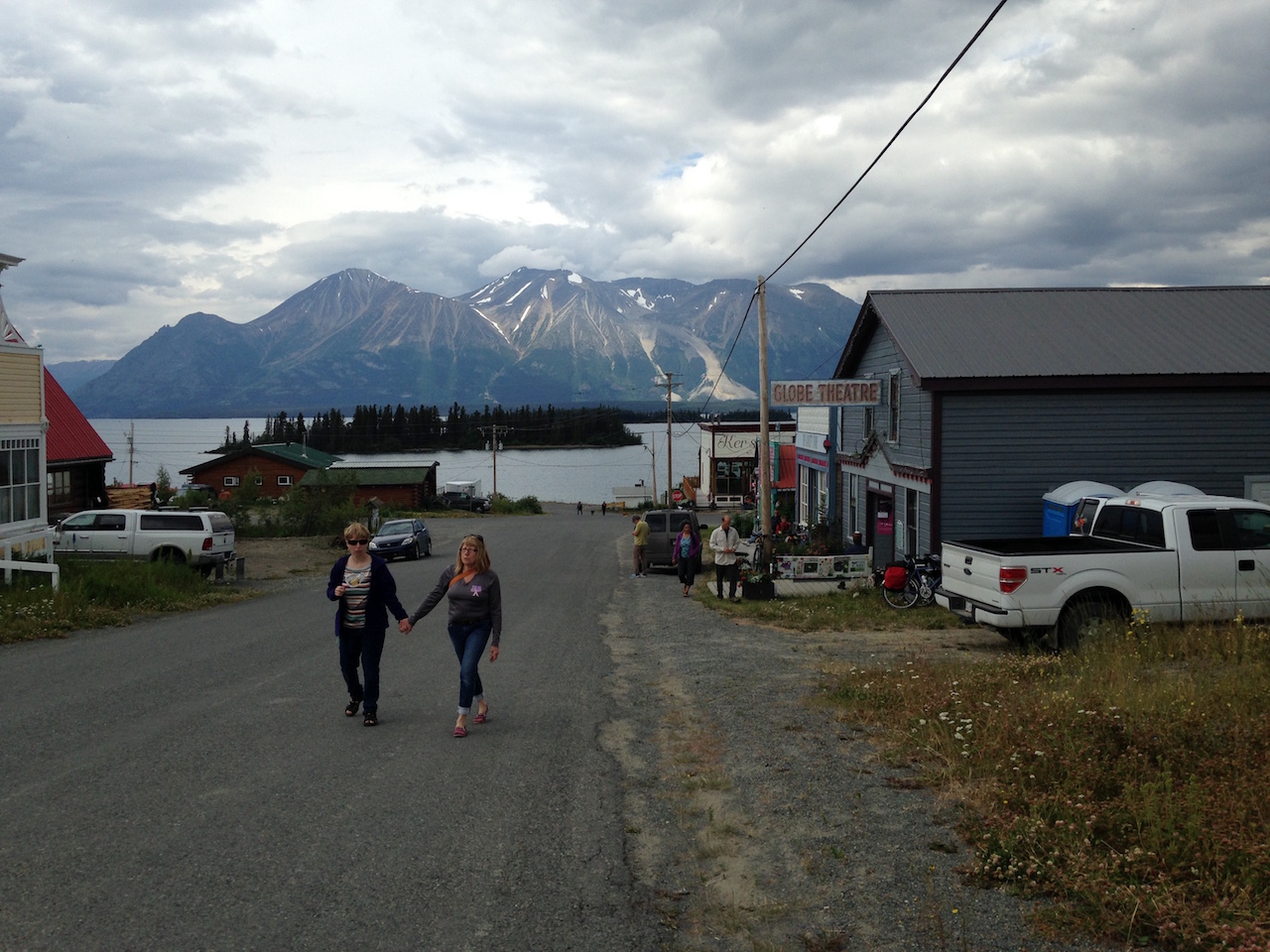
View of Atlin Mountain from downtown.
Paul’s property is a few minutes drive from town. We stopped to get water from a spring, then continued down a quiet road until we came to a long gravel driveway that led to the cabin he built by hand when he was in his twenties. It was much larger than I imagined it to be. It was neatly furnished, welcoming and comfortable. He hooked his truck’s battery to the cabin wiring which allowed us to have some light and a TV on. We could watch Gunsmoke, Perry Mason, or any of the countless old black and white movies he’d collected over the years. Cooking was easy. With a small propane cooking ring on the wall and the top of the woodstove to keep things hot, we had everything we needed for three meals a day. Not having a fridge is a problem in summer, but we managed with a cooler and an easy-going attitude. I surprised myself by being quite at home.
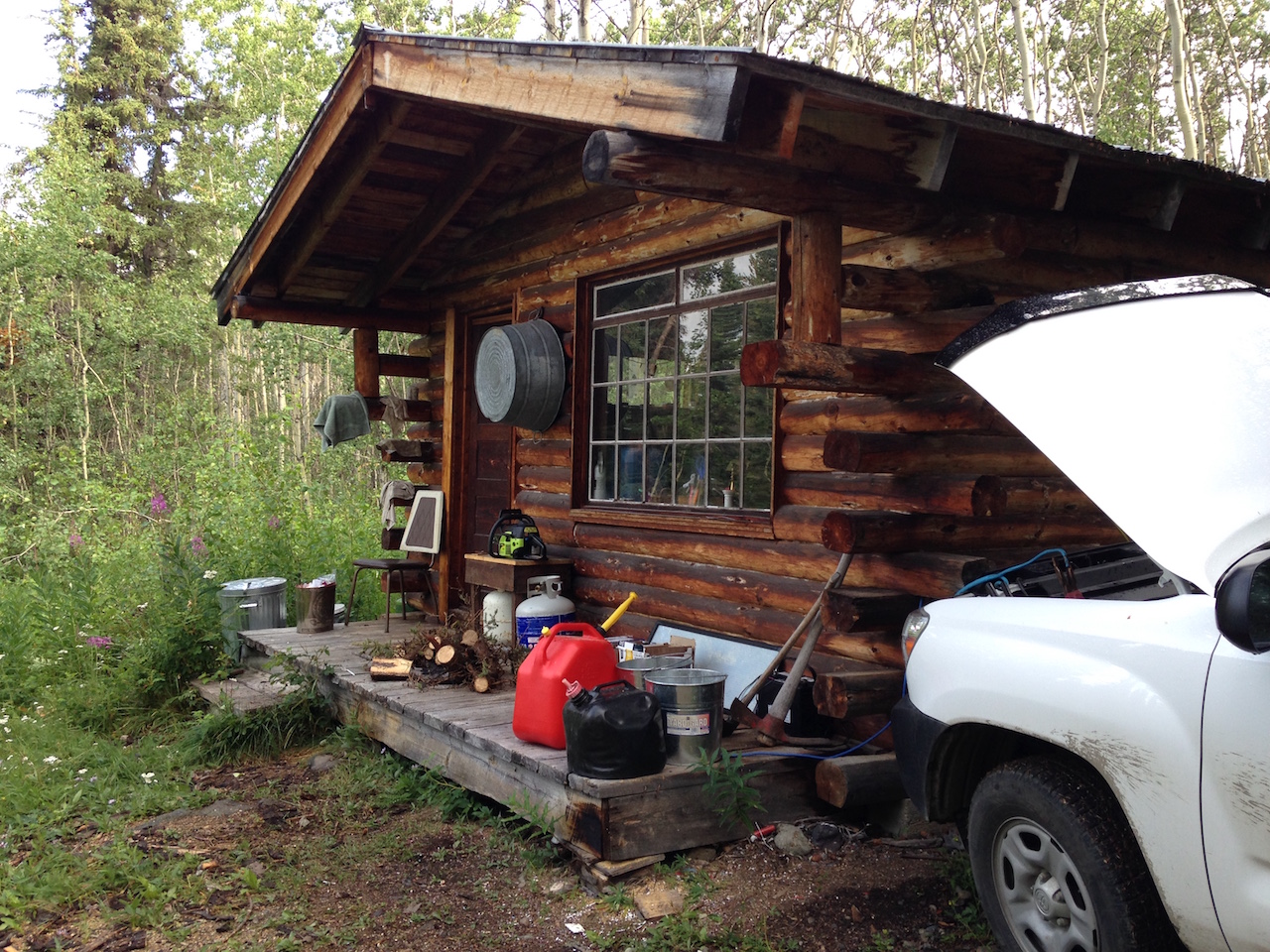
Paul’s Cabin
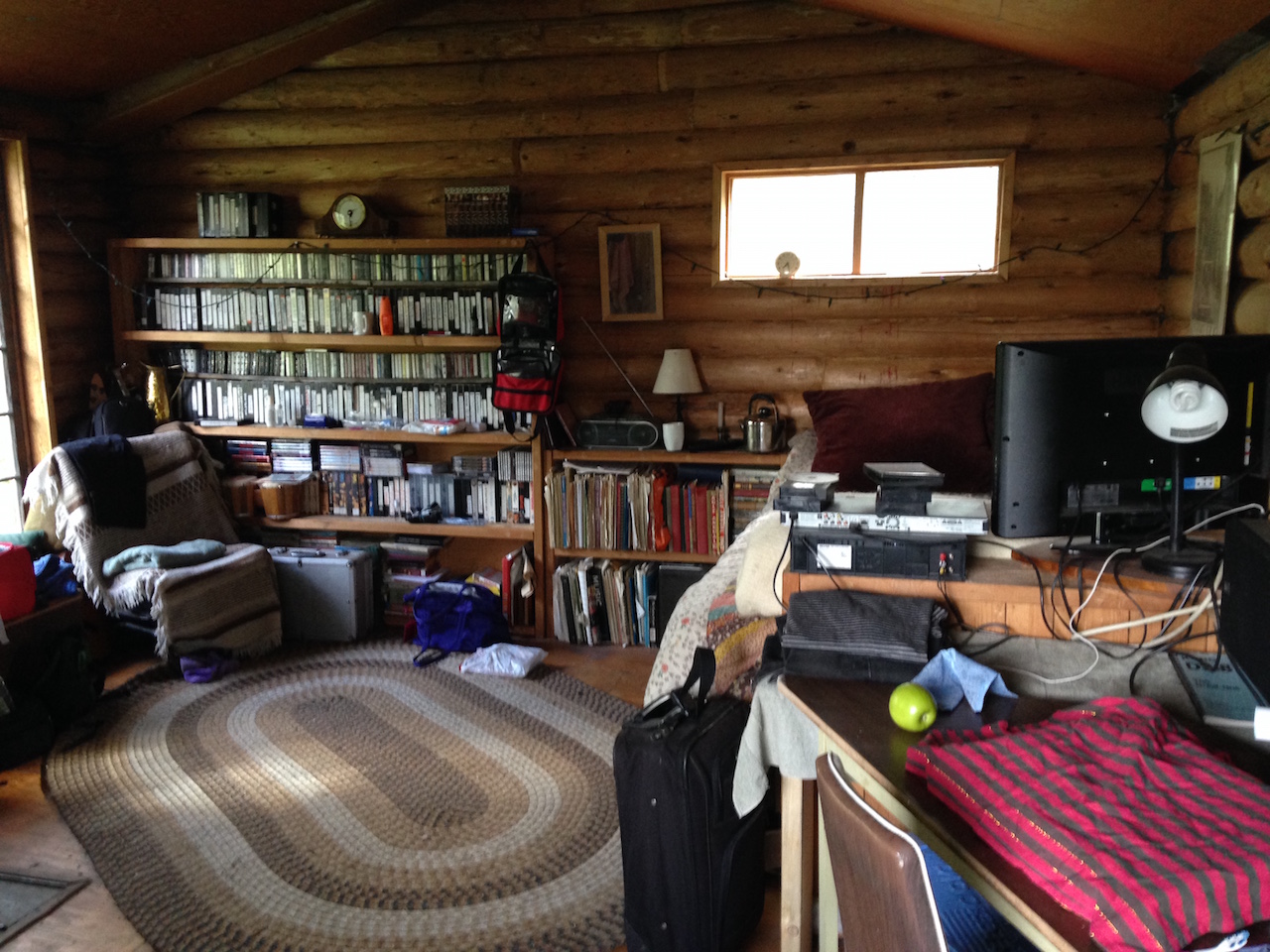
Inside Paul’s Cabin
On the day I arrived, the music festival venue was being set up. In a lakeside field, an enormous striped tent for the main stage had been erected and surrounding this were many smaller tents where artists and craftspeople were setting up shop. Food trucks were arriving. The local Tlingit community provided a comfortable meeting space in the centre of the compound where bannock, fry bread and other northern foods were being prepared. It was a much bigger event than I had imagined it to be.
Knowing they would be needing volunteers, I offered my two hands and was immediately given a shift in the beer tent from noon until four o’clock the following day. I was in! Camper vans, trailers, tents and any number of travel contraptions filled every available space. Every field, every vacant property, and even backyards were filled with campers. Every road within walking distance of the fairgrounds was lined with trailers and tents. The town was filled to the brim and the festival had not yet started.
Performers set up around noon on the first day and Paul’s Trio was scheduled to play at 6:00 pm. It was fun to be backstage and watch everything being set up. I soon discovered why wives and girlfriends of the guys in the band don’t follow them on the road. Unless you can play a vital role in the production, you do a lot of sitting around. First the equipment gets hauled in. Everything is tested and instruments are tuned. Then the guys have a beer. A bit of practicing might happen if there’s time before the performance, but if the guys are standing in the wings waiting to go on, they are far too preoccupied to talk to anyone but technicians and each other. The performance takes place and it’s great to be able to watch from a close vantage point. It’s also fun to have a backstage pass. You can go pretty well anywhere as long as you are quiet, respectful and out of the way. When the set is over, you wait while the guys pack up their gear. They are always emotionally charged by the event and want to talk about it amongst themselves, so wives and girlfriends wait again. Then everyone goes for a beer. One full weekend of this was great fun, but I could see that I would have to become a serious technician with an understanding of how to transport, fix, tune and set up all the equipment, or be forever waiting around!
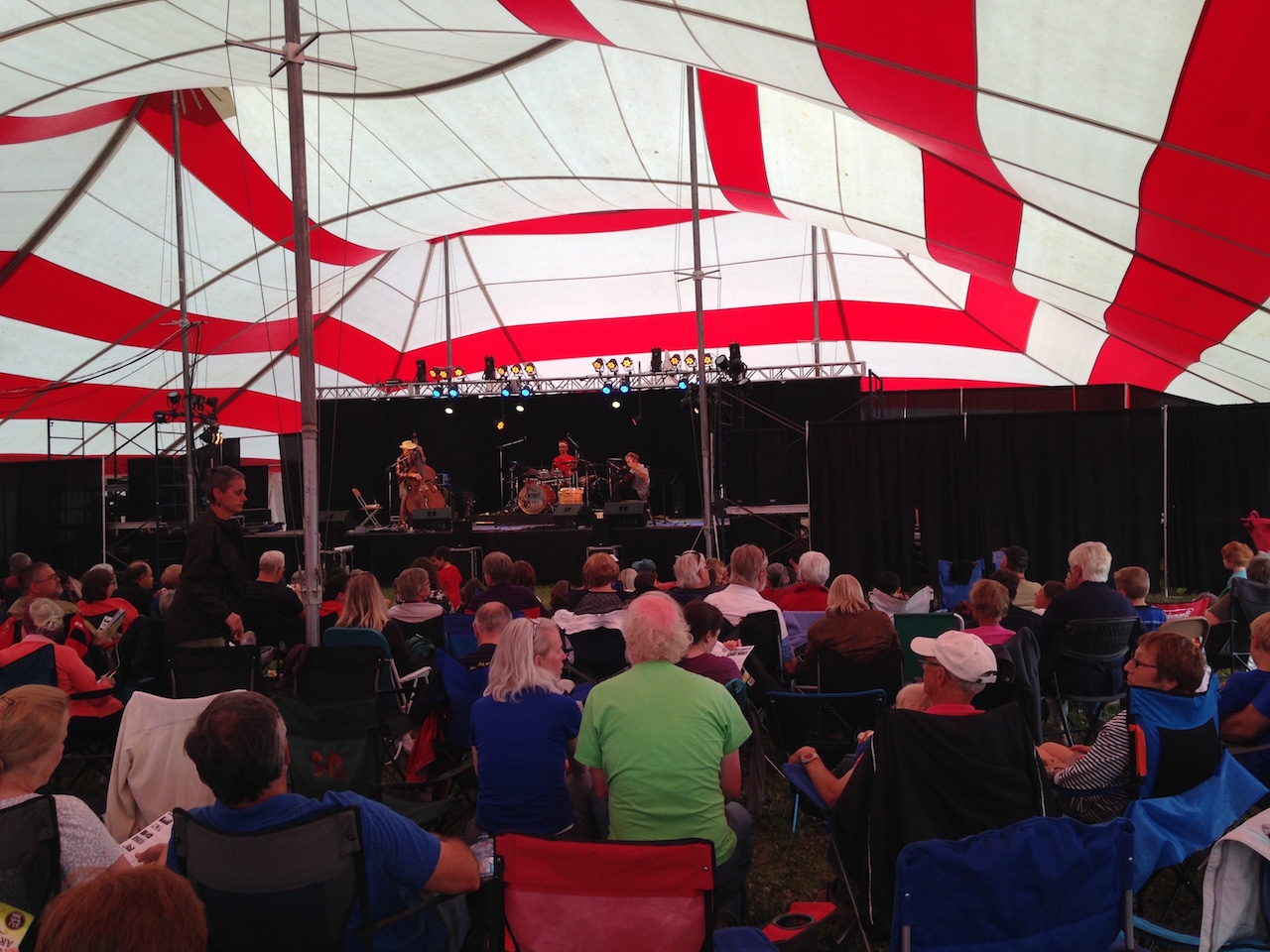
Trio performs inside the main tent.
Hanging out with musicians has an interesting personal side. Each band is a unit, a solid working team with an emotional bond that transcends friendship. A group which performs professionally, travelling together for work and recording sessions, has to forgo a typical family life. The band becomes their family. I saw firsthand how closely each member of a band relates to the other musicians. Every look, every gesture plays a significant role in the way a piece of music is played. It’s exhausting and exhilarating at the same time. Being a professional musician requires all of your energy, all your emotional strength, and all of your creative ability. Good music comes with a heavy price, and amazingly, people think they should have it for free.
From backstage, Paul and I watched Bruce Cockburn. What an incredible guitarist he is. We sat beside the sound system under the big metal bars, which supported the speakers. We were just a few feet away from him. What a privilege. We were able to watch a number of performances this way. There was blue grass, comedy, Innuit throat singing, blues, new age and jazz. For me, it was endlessly fascinating, and three days seemed to disappear in seconds. The festival ended with a farewell ceremony by the Tlingit dancers dressed in traditional regalia. Then the big tent came down, the grounds were cleared, and a river of tents, trailers and vans drained out of Atlin.
As the guest of one of the entertainers, I was welcome to enjoy Atlin’s hospitality during and after the shows. Great meals, free drinks, and freshly smoked salmon were available each day. What a treat. One very generous gift was the offer of a helicopter tour of the ice fields nearby which included a trip into "Lake, No Lake." With just 6 seats available, space was reserved for performers only, but as luck would have it, there was room for me! Jamie Tait, our pilot and manager of Tundra Helicopters, Atlin, gave us all a good briefing, and on the morning of the 10th, we lifted off the ground and floated out across the tundra over Atlin Lake and south towards the glaciers. The scenery was spectacular—something few people will get to see. Certainly none of this is easily accessible, other than by helicopter.
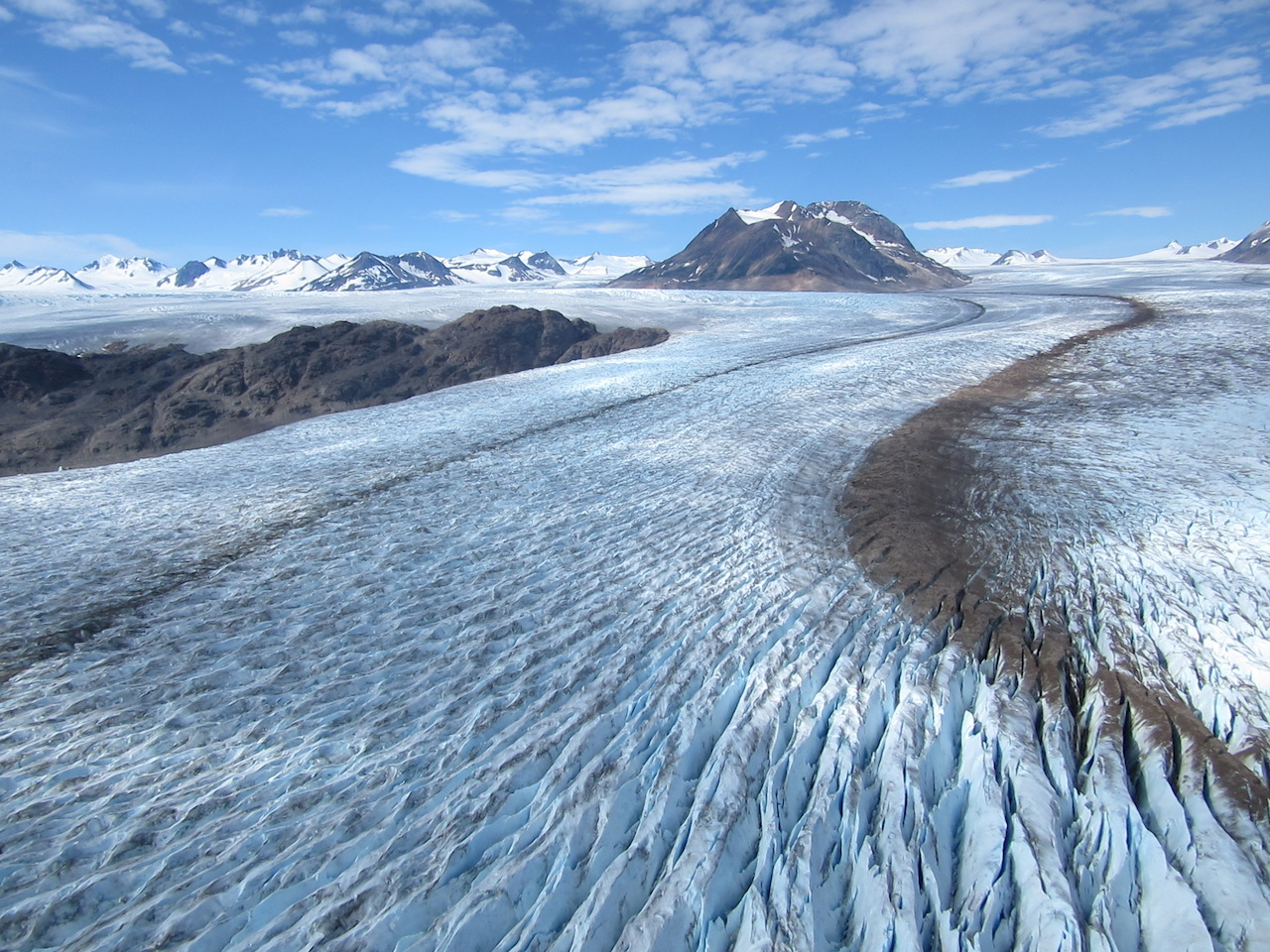
Aerial view of glacial flow.
It might have taken an hour, but we eventually reached one of the glaciers and followed its striped and deeply corrugated surface around towards a natural phenomenon called "Lake, No Lake." A scientist should be describing this to you, but from what I could understand, the "toe" of the glacier dams the run off of water. It takes a year for the lake to form. Once the lake fills enough, it causes the "toe" of the glacier to float, releasing the lake’s contents over 2-3 days, flooding the Tulsequah and Taku valleys downstream. What remains is the dry, sandy lake bottom and an enormous ice cave through which the river continues to flow. If you are lucky enough to be there when the dams breaks through, the lake is there one minute and gone the next, so "Lake, No Lake," is a real destination…and well worth the trip!
Jamie put the helicopter down on the floor of drained "Lake, No Lake," and we were permitted to walk about freely, as long as we paid attention to the now exposed walls of ice around us. For all of us, this was like walking on the moon. The rounded pebbles on the wide lake bottom were ground smooth; the glacial sand was powdery and pale yellow. Our footsteps looked foreign, as if they didn’t belong there and neither did we! Around us, the towering glacier seemed to be alive as sheets of ice slid continuously into the river. Inside the cave we could hear the crashing sounds of falling ice.
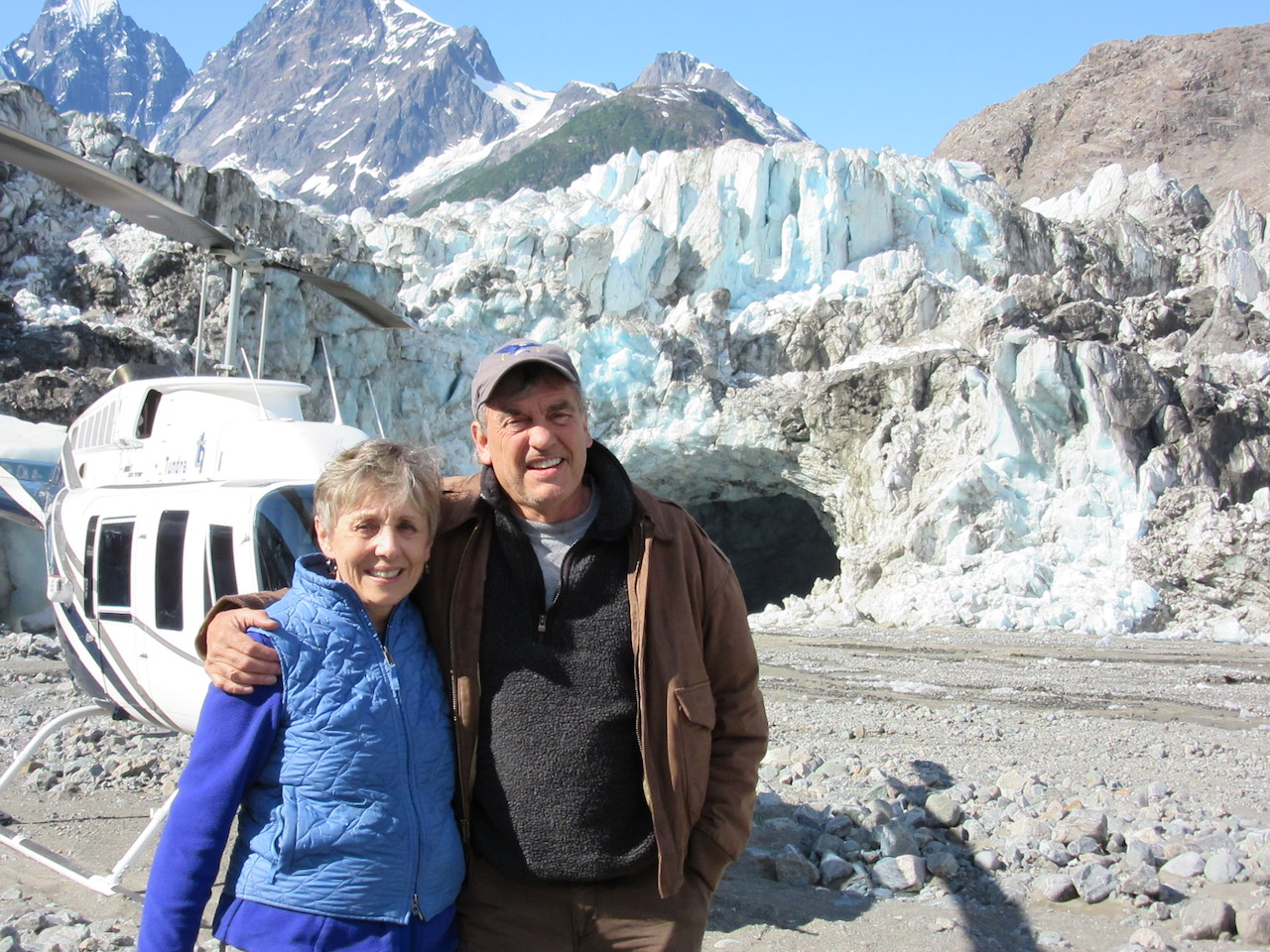
Paul and me in front of ice cave.
Across the basin from where we were standing, a column of ice, easily the size of an apartment building, fell into the river. The ground shook. The enormous splash whipped the water up into a brown foam, which swirled up into the air, then plunged back into the river and was carried invisibly away. We took pictures, but nothing could capture the awesomeness, the beauty and the power of the place. After about half an hour, we returned to the helicopter, changed seats to share the view, and lifted again like magic into the air. We returned to Atlin in silence—none of us could speak. What we had just seen was indescribable.
With the festival over, the town of Atlin resumed its normal pace. People who had been scurrying about on a mission were back to work, back to doing what they always do, which in Atlin, can be pretty amazing. Paul’s friend, Judy, flies a float plane. She ferries tourists about and takes supplies into fishing camps. She is also an artist of considerable talent, as are many of his other friends. His friend John is a "collector" who has managed to amass the most impressive assortment of useful items one could imagine. A trail of interesting stuff leads to his comfy home, where just about every musical instrument known to man has been collected and carefully stored. John, a craftsman and guitar maker, also makes the best coffee I have ever tasted. He is the town’s resource for parts, tools, equipment, and well, just about anything.
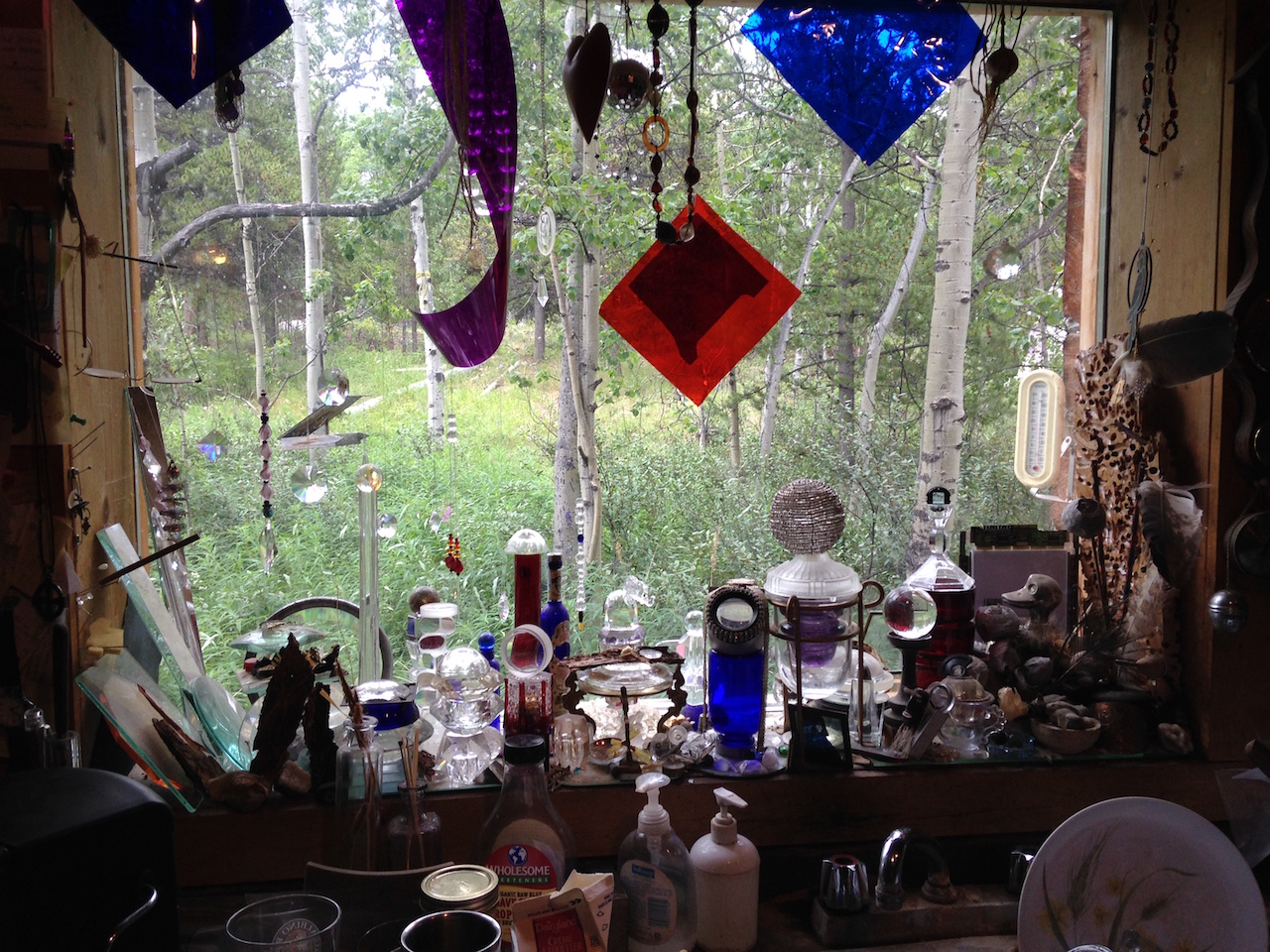
John’s wonderful kitchen window.
In a small town, you are likely to meet the newspaper editor, the doctor and the undertaker, and sometimes they are all the same guy! If you wander into a shop, you might well be there an hour as few folks watch their clocks, and conversations are never boring. I was glad to have lived in Lynn Lake Manitoba for awhile. All the elements of remote, small town living were so familiar in Atlin and I felt I could set down roots again, right there.
Paul is still in Atlin. He has a few more gigs to do. Artists and musicians can make a living in the north, which is why so many of them live there. I’m back home again and wondering why some days go by so fast. My dad would have loved that trip to Atlin. Who knows…Atlin felt so familiar to me, so easy to embrace. Maybe in a past life, he prospected there, and if he did, there’s a very good chance…I was with him.

